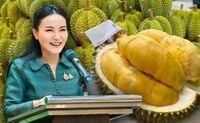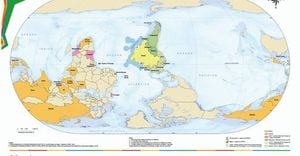On May 8, 2025, Dr. Narumol Pinyo-sinwat, the Minister of Agriculture and Cooperatives, addressed the preparations for exporting durian during the peak production season. The Ministry of Agriculture and Cooperatives has been working closely with the General Administration of Customs of the People's Republic of China (GACC) to discuss various measures to facilitate and resolve ongoing issues related to durian exports. These discussions include the registration of additional labs and the review of existing labs, as well as preparing sufficient personnel to support exports.
Dr. Narumol stated that since this is the peak production season for Thai durian, there is a significant demand to export to China in a timely manner. She has coordinated with Chinese customs to ensure that relevant checkpoints are well-prepared. This includes implementing a special working method that operates 24 hours a day, seven days a week, along with increasing the number of staff and inspection equipment. China will collaborate with Thailand to explore further facilitation measures, such as expediting classification procedures and customs clearance.
"The close cooperation between both parties will ensure that durian exports from Thailand this year proceed smoothly. The Ministry of Agriculture would like to thank GACC and the officials who have prioritized facilitating the import of durian this year, including having staff work 24/7, extending the opening hours of checkpoints, and increasing the number of labs for inspections at the Chinese import points," Dr. Narumol noted.
Regarding the labs that analyze the presence of "Basic Yellow 2" (BY2) in fresh durian before export to China, Dr. Narumol explained that Thailand currently has nine out of ten labs ready for testing. They have submitted a request for the Central Laboratory (Thailand) Co., Ltd. in Chachoengsao to resume its qualifications and are awaiting a response from China. However, she is confident that the nine labs are sufficient to handle the large volume of durian set for export to China.
Meanwhile, the Joint Standing Committee on Commerce, Industry and Banking (JSCCIB) has revised Thailand's GDP forecast for 2025 from a range of 2.4-2.9% down to 2.0-2.2%. This adjustment comes in light of various factors, including the impacts of trade relations with partners and revisions to import standards from the United States. The JSCCIB, which includes the Federation of Thai Industries (FTI), the Thai Chamber of Commerce (TCC), and the Thai Bankers' Association (TBA), revealed its updated economic outlook during its May 2025 meeting.
Kriengkrai Thiennukul, Chairman of the FTI and representative of the JSCCIB, expressed concerns over trade diversion resulting from the new Chinese import standards. He emphasized the importance of closely monitoring trade relations between Thailand and China, particularly regarding these standards, as they could significantly impact Thai exports and potentially divert trade to other countries.
China has been the main importer of Thai agricultural products, accounting for 36% of Thailand's export value. Over the past decade, imports of Thai agricultural products into China have reached approximately 1.4 trillion baht. The JSCCIB is particularly worried about the impact of trade diversion on Thai exports to the Chinese market, which affects around 3.7 million people and nearly 5,000 SMEs.
Furthermore, the JSCCIB highlighted that the economic recovery in Thailand remains fragile and requires further support to boost exports to new markets, including those in countries with high economic potential such as BRICS. The committee expects Thailand to reduce its dependence on the Chinese market to about 10% in the second quarter of 2025 and further decrease Chinese standards by 10% by the end of 2025, which should enhance Thailand's GDP growth by 0.3-0.9% from the previous forecast of 1.5-2.5%.
In addition to these challenges, the JSCCIB has raised concerns about the potential impact of a 36% tariff imposed by the United States on Thai exports, which could lead to a significant decline in export volumes and GDP growth. If such tariffs are enforced, the Thai economy may only expand by 0.7-1.4% this year, a stark contrast to previous expectations.
As the global economic landscape becomes increasingly uncertain due to trade tensions and tariff policies, the JSCCIB has called for urgent negotiations with the United States to reduce tariffs and enhance the competitiveness of Thai businesses. Kriengkrai noted that the private sector is eager to see economic stimulus measures implemented both in the short and long term, particularly as economists have significantly lowered their growth forecasts for Thailand.
In light of these developments, the Thai government is urged to adopt measures to stimulate the economy and mitigate the adverse effects of trade tensions. This includes restructuring the economy to rely more on new markets and accelerating the negotiation of free trade agreements (FTAs) with potential economic partners.
In summary, the Thai government is taking significant steps to ensure the smooth export of durian to China while addressing broader economic challenges. The collaboration between Thai authorities and Chinese customs aims to facilitate trade, but external pressures, particularly from U.S. tariffs and changing trade dynamics, pose ongoing risks to Thailand's economic growth.




